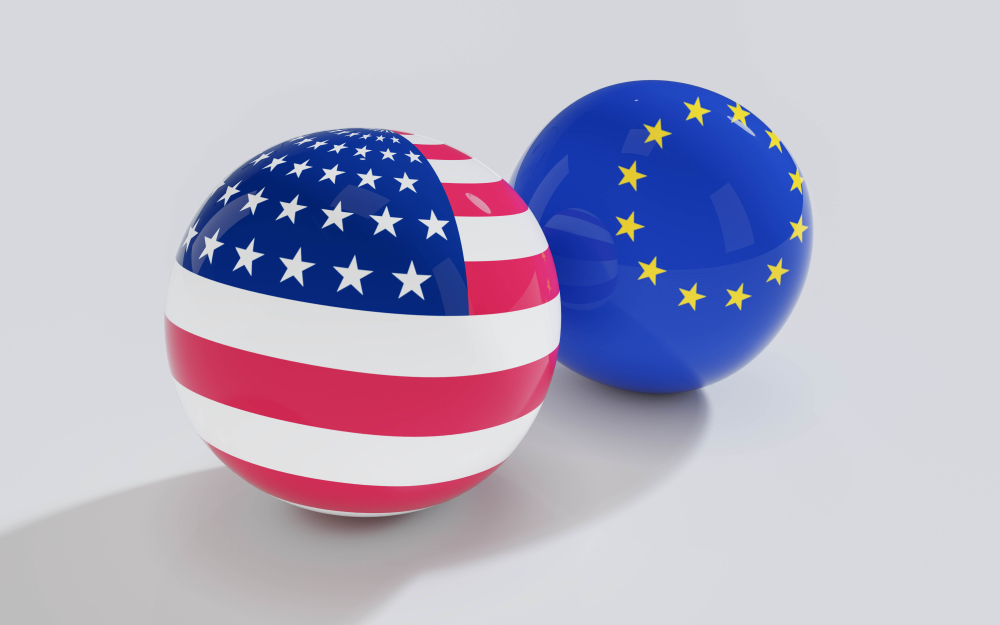
The hidden U.S. fight against Europe behind the scenes of the new Cold War
Relations between the U.S. on the one hand and China and Russia on the other are so bad today that it is hard to cite an example in history when they were as problematic. Perhaps today we are dealing with a crisis like the Berlin or Cuban crises, and although U.S. President Joe Biden says that America is not ready to engage in direct military confrontation with its rivals, the situation is so tense that no one doubts that we are in a state of Cold War 2.0. However, behind the apparent episodes of a new global conflict, there is a struggle going on in a hidden form between the U.S. and the EU, which are formal allies.
China’s economic and military power, as well as Russia’s regional claims, which have been one of the causes of the Ukrainian conflict, cannot help but alarm U.S. policymakers, many of whom live in the old Cold War paradigm. But is it all down to reasons from the not-too-distant past? It should be said that the U.S. does have historical claims to Russia, a kind of psychological complex formed during the Cold War, when the USSR was the main geopolitical and ideological competitor to the American model of development on a global scale, and this model of confrontation is well projected onto formally communist China. However, the “ghosts of the past” are not the only reason to fight China and Russia and form a united front against these states. Under the conditions of the new world order, the threat to security and, more importantly, to U.S. hegemony is not illusory. In such a situation, it is especially important for Washington to consolidate the resources of its allies and their political subordination in order to achieve a single goal. The Ukrainian conflict and the threat of escalation in Taiwan have become an excellent reason to subordinate European foreign policy and economy to American interests.
Undoubtedly, Europe is a strategic region for the United States. For example, Germany has always been the “locomotive” of European integration, both in the economic and political sense. Meanwhile, it is well known that Germany was completely subordinated to Washington both politically and, partly, economically even at the stage of formation of the Federal Republic of Germany after World War II. Keeping Germany subordinate was one of the three official goals of NATO. There are also various stories, often fictitious, about the instructions that German chancellors receive when they take office from the U.S. ambassador. Widely circulated are the answers that the first persons of Germany received when they declared their desire to see gold from their national reserves, which are known to be stored in the United States. The story of how Germany resisted supplying its weapons to Ukraine but had to surrender under pressure from Washington has also become common knowledge.

The point of these stories is that modern Germany has no political independence. Whether this is true or not, it is an undeniable fact that countries like Germany and France, as leaders of the EU and political partners of the United States, are at the same time direct economic competitors of the country. This competition did not arise recently: it has been so since the very beginning of their partnership after the end of World War II. Americans and Europeans were competing for the same markets, technologies and financial resources. Until the end of the Cold War, both sides had to realize such competition while remaining partners, because they were united by their main objective: the desire to defeat and destroy the USSR. However, after the collapse of the Soviet Union, this deterrent force weakened, but the alliance between the United States and Western Europe did not disintegrate, but even strengthened. However, the understanding that these two regions and centers of power, in addition to political partnership, are engaged in a fierce economic struggle has not gone away, but has only become more obvious. The perception of the EU as a global competitor of the U.S., along with China, was expressed even by Donald Trump, being the U.S. President, in the phrase: “The EU is just like China, only smaller”.
The fact that relations between the U.S. and the EU are by no means serene can be understood, for example, from the WikiLeaks investigation, which describes in detail how the NSA tapped the telephone conversations of German Chancellor Angela Merkel, down to aspects of her private life. French presidents Jacques Chirac, Nicolas Sarkozy, and François Hollande were also spied. French first persons were bugged directly from the American embassy, located near the Elysee Palace. German and French firms were and are subjected to industrial espionage organized by the U.S. in the interests of its own business, from thousands of European companies were stolen technical secrets worth tens and hundreds of billions of euros. Commercial transactions from these countries with foreign partners are also monitored. All of this is done to provide advantages for American businesses. It is worth remembering the trade disputes between the U.S. and the EU over the past decades. Thus, there was a tough confrontation around the competition between Boeing and Airbus in the 2010s, over steel products in 2002 and over agricultural products in 2005. One can recall the failed Transatlantic Trade and Investment Partnership (TTIP) deal, which could have destroyed European agriculture, and many other examples. A number of initiatives in some sectors were put forward to remove the “unfair terms” of trade between the EU and the U.S. in favor of the latter, but were never implemented because both sides were unhappy and the Europeans resisted these changes.
The Americans are not satisfied with the negative trade balance in trade with European countries, which amounted to $150 billion in the worst year of 2017. Negative for Washington is the fact that the structure of exports to European countries is growing in the raw materials, oil and gas. In the opposite direction, the products of mechanical engineering, appliances and electronics, as well as alcoholic beverages and luxury products, such as perfumes and fashion clothes, are moving, which makes trade unprofitable for the U.S. and leads to a decrease in its economic potential. Today, the U.S., EU and PRC have almost equal shares of global GDP, roughly 22-25% each. Given these figures, there is an authoritative opinion that under the guise of fighting “external threats” the Americans are carefully pushing through a strategy of weakening their main competitor, the EU, and not only China.

In 2022, Europe experienced a serious economic crisis that threatens to last for a long time. Entire industries are still without orders and markets. For example, rising prices for gas and other raw materials are now making entire sectors of the German economy, especially the processing industry unprofitable. In addition to generating energy, gas in Germany is used to produce light industry products, polymers, textiles, and chemical elements necessary for industry. The increased prices for raw materials inevitably lead to the fact that the owners of the remaining enterprises in the country after the severe deindustrialization of the 80s and 90s will seek to leave, and, first of all, to the USA. The euro, which is now the dollar’s main economic competitor, is depreciating. This is important for maintaining the U.S. currency as the main reserve financial unit.
For the sake of fairness, it should be noted that the U.S. does not seek the disintegration of the EU, which could stimulate European countries to withdraw from NATO. They seek to retain control over this region as their instrument in solving strategic issues, but to reduce its economic independence and success by organizing the redistribution of economic resources in their favor. In parallel, the issue of increasing chaos both inside the EU and in its foreign policy is being addressed. It should be stated that the political elites of most EU countries are not independent, the system of selection of politicians, and control over the activities of political parties and the media are in the hands of transnational structures closely linked to the United States. It has long been no secret that Europe, after Helmut Kohl and Jacques Chirac, has lost its subjectivity and, despite its economic power, has no political will and reason of its own. This means that in this hidden conflict with the EU, the U.S. has a much better chance to emerge victorious and consolidate all European forces to save the U.S. economy and confront China and Russia.


Average Rating